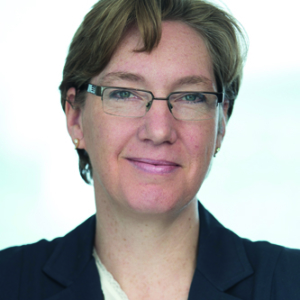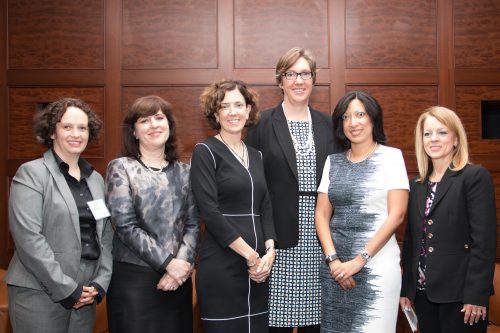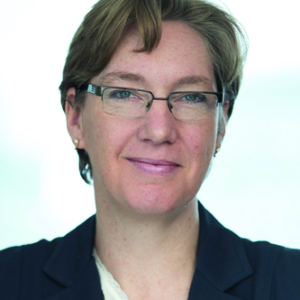 Deborah Lorenzen is the head of Enterprise Data Governance at State Street. We caught up with her to discuss what is energizing her as we enter 2020 and what she hopes to achieve for herself and for others as a change leader for women in the workplace.
Deborah Lorenzen is the head of Enterprise Data Governance at State Street. We caught up with her to discuss what is energizing her as we enter 2020 and what she hopes to achieve for herself and for others as a change leader for women in the workplace.
Nicki from theglasshammer (NG): Deb, we have profiled you before and you have attended as a panelist some of our career events over the years. I have always held you in high esteem as someone who walks the talk when it comes to helping other women and as a change leader for systemic issues. What lessons have you learned from 2019 and this decade generally to take into 2020 and the next decade?
Deb Lorenzen (DL): If you really want it you have to keep after it, even when it is hard. You just have to keep turning up for the fight. That said, if you are not having fun anymore, quit. That might sound blunt, but honestly, if you aren’t finding joy in what you spend much of your life doing you won’t be successful. So stop, regroup, and find the thing that gives you joy.
From a job title perspective my career path looks non-linear. I’ve always been curious about the next challenge. The strong thread that has held it together is executing on strategic change programs, whether that was acquisition or divestiture, global operating model changes, launching a new product or service into the market or closing down something that wasn’t successful, as well as the inevitable regulatory change. Diving into these change opportunities has provided the chance for me to live and work around the world, provided value to the firms and people who have been part of these efforts, and fed my own leadership journey into how operating models and organizations work.
NG: What excites you about 2020?
DL: In January 2020 I will begin teaching my first MBA course, an elective titled Executing Strategic Change at Providence College. Having spent much of my career driving major change programs it is exciting to pull all of those examples back out to consider what made them successful, and what I would do differently in hindsight. I’m looking forward to the exchange of ideas with a group of future thought leaders. Preparing the course has also been a good reminder of how much has been accomplished during my career.
NG: What trends in your industry are of particular interest to you?
DL: Right now, my focus is on Data Governance and how we help long-standing firms make the shift from application-oriented architecture to properly data-driven architecture. This is the classic example of a strategic change program where we are trying to change the engine and the tires of the bus while still driving down the highway. Fortunately, we have a fantastic team who are all focused on getting this done, and we have leadership in place who both understand what we need to do and are driving resources into place to support our goals.
NG: What is the one thing you know now that you wish you had known when you were first starting your career?
DL: There are so many things I wish I had known. Having grown up in a rural environment with more cows than people, there were very few accessible role models for working in the global financial markets so I couldn’t even have articulated that was what I wanted to do. In hindsight, I wish I had known all of this existed much earlier than I did. These days I spend as much time as I can mentoring new entrants to the financial world on how things work – how you manage salary and benefit negotiations, which lines of business or functional roles give you the most opportunity, how you find out what they are saying about you when you are not in the room so you can do something about the perception. There is no rocket science inherent to these lessons for readers of Glass Hammer, just value in remembering to ‘each one – reach one’ whenever we have the chance.
NG: What, if any, are the main barriers to success and/or challenges for women in your industry?
DL: I used to say that in New York there is so much competition they will take you out for any excuse they can find. I still believe that is true today, and not just in New York. The thing we have to keep working at diligently is making sure the successful excuses aren’t based in gender bias. Ensuring leadership understands inclusion also helps; tying compensation to actual progress is useful but imperfect. Putting daylight on hiring practices, promotion processes and open opportunities is useful as it forces leaders to think through their decisions in a different way.
NG: What advice would you give to young women in the industry or thinking about entering the industry?
DL: For new entrants I would tell them to just go for it. They shouldn’t listen too long to the stories from my generation because the rules ARE actually different now and they shouldn’t get bogged down in our histories. Newer entrants should use the network available – those of us who have been at it for 20+ years – as for the most part we’ll tell you anything you want to know about how the industry works. If we were to change anything we should simply dedicate more support to the next generation. We’re standing on the shoulders of giants ourselves, and we should give the next generation a hand up.
NG: What bright spots are there for gender equity at work?
DL: Working in the finance I learned long ago to ‘follow the money.’ On that front, the movement of institutional money toward Environment Social Governance (ESG) over the past few years is hugely gratifying. The impact is being seen right now in movement toward gender inclusion on Boards as well as investment in firms that reflect ESG goals and inclusive teams. The leverage available by focusing Institutional funds – pension plans in particular – toward ‘good’ goals is helping to make meaningful improvements in the marketplace.. At State Street we are helping to lead the move toward ESG by providing knowledge and infrastructure.
More locally, State Street has a group of ‘Leading Women’ made up of Executive Vice Presidents. They have been doing a great job of being visible and offering their wisdom and experience through lunches and speakers series. They represent a fantastic group of role models and the activities they are driving are helping to inspire a new generation of leaders.
NG: Outside of work, what is ‘sparking joy’?
DL: One of my joys is sitting on the Advisory Board for Global Female Leaders, an annual economic summit in Berlin where we join leading women from around the world representing politics, business and philanthropy to discuss the geo-political landscape and economic trends. Not only do I get to spend one long weekend each year surrounded by some of the most amazing women I’ve ever met, but I’ve also developed relationships that have provided insight and opportunity, as well as the confidence, to extend my life’s work in new directions.
On the personal front, our house is incredibly active right now, with three school-age children and all of the activities that brings, feet in two countries (my husband is Danish and I’m from California), and a full-time career. Teaching in the Providence MBA program will keep my mind active in the Spring. Beyond that I’m coaching 5th grade travel basketball as well as sitting on the Board of the travel program, and I’m co-leader of a Junior Girl Scout Troop. We are, at the behest of my eldest, fostering dogs for a rescue program here in Massachusetts, and have three puppies we began fostering at 7 days old thriving in the corner of her bedroom.
My hopes for the coming decade are to watch my children’s generation finish their education and enter a workforce that is more inclusive than we have today, with a set of clear rules for the game that are the same for everyone – a big ask, I know. For my part, my shoulder will still be on the wheel, mentoring, teaching, working, speaking truth to power about how it still is and what needs to change. And if culture can be defined as ‘how you get things done around here,’ I’ll continue driving for the continuous improvement of an inclusive culture.


